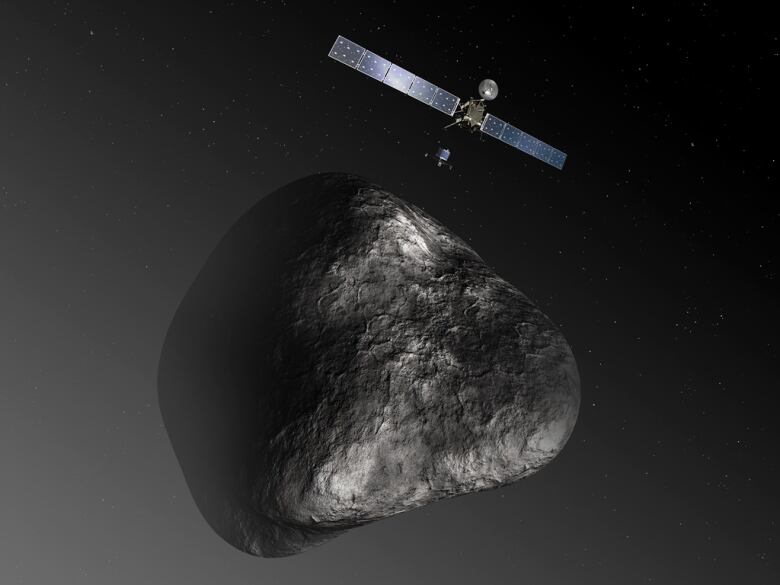Rosetta comet probe wakes from space hibernation
A comet-chasing space probe that has been in hibernation for almost three years has woken up and sent its first signal back to Earth.
The European Space Agency received the all-clear message "Hello World!" from its Rosetta spacecraft some 800 million kilometres away shortly after 7 p.m. (1 p.m. ET).
- Bob McDonald: How you can help wake up a sleeping spacecraft
- 1st spacecraft comet landing preparations underway

Rosetta was put into hibernation in 2011 to conserve energy for its long journey to meet with comet 67P/Churyumov-Gerasimenko.
If all goes as planned the probe will rendezvous with the comet in the coming months and drop a lander onto its icy surface in November.
Scientists had earlier faced an agonizing wait of several hours until the first signal reached Earth, allowing them to celebrate a new milestone in their unprecedented mission to land a spacecraft on a comet.
[U]nderstanding comets is also important to see in the future what could be done to defend the Earth from comets- Paolo Ferri, head of mission operations at the European Space Agency
Rosetta is named after a block of stone that allowed archaeologists to decipher ancient Egyptian hieroglyphs. Scientists hope the probe's findings will help them understand the composition of comets and thereby discover more about the origins and evolution of our solar system.
Comets are regarded as flying time capsules because they are essentially unchanged for 4.6 billion years. Scientists have speculated that comets which are essentially giant, dirty snowballs may be responsible for the water found on some planets. And like asteroids, comets also pose a theoretical threat to life on Earth.
"Over the millennia comets have actually affected our evolution," saidPaolo Ferri, head of mission operations at the European Space Agency. "There are many theories about comets hitting the Earth and causing global catastrophes. So understanding comets is also important to see in the future what could be done to defend the Earth from comets."
Lander to drop on icy surface

If all goes as planned, Rosetta will reach 67P in the coming months and fly a series of complicated manoeuvres to observe the comet a lump of rock and ice about four kilometres in diameter before dropping a lander onto its icy surface in November.
The Philae lander will dig up samples and analyze them with its on-board instruments.
The probe and its lander will keep sending back data until their batteries die or the debris streaming off the comet irreparably damages their sensitive instruments.
The mission is different from NASA's Deep Impact probe that fired a projectile into a comet in 2005 so scientists could study the resulting plume of matter. NASA also managed to land a probe on an asteroid in 2001, but comets are much more volatile places because they constantly release dust and gas that can harm a spacecraft.
NASA is planning another space rock mission between 2019 and 2021. The agency is looking into sending a robotic spaceship to lasso a small asteroid and haul it close to the moon, where spacewalking astronauts would explore it.













_(720p).jpg)


 OFFICIAL HD MUSIC VIDEO.jpg)
.jpg)



























































































